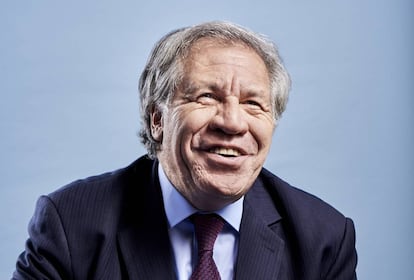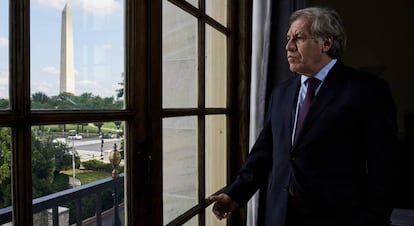“Sometimes failures can also bring progress toward democracy”
The Secretary General of the Organization of American States likes to go against the grain. Born into a peasant family in Uruguay, Luis Almagro grew up to be a rather undiplomatic diplomat. The nemesis of Venezuelan President Nicolás Maduro, he’s also a vegetarian, a sportsman, and he’s become a leftist politician whose defense of democracy has made him a pariah with the apologists of South America’s authoritarian regimes

Luis Almagro, the Secretary General of the Organization of American States (OAS), is a man who defies classification. A peasant from Uruguay who developed an illustrious global career in Iran, Germany, and China. An undiplomatic diplomat who passionately defends his ideas and seldom shies away from controversy. A leftist whose defense of democracy has irked leftists who justify South America’s authoritarian regimes.
That fight has been his clarion call since he took stewardship of the OAS – the main political, legal, and social forum for the Western hemisphere – in May 2015. Since his arrival, Almagro has shaken the OAS out of its bureaucratic torpor. He dusted off the Democratic Charter, brandished the organization’s principles in defense of democracy, and became the arch-nemesis of Nicolás Maduro’s regime in Venezuela. A vegetarian, animal-lover, father of a large family and an athlete, Almagro was minister of Foreign Affairs for Uruguay between 2010 and 2015 under the government of José Mujica.
Whenever I say ‘I don’t want to do that,’ that’s exactly what I end up doing
Moisés Naím: You have three big disagreements with your native country of Uruguay. The first is nutritional. Your country is one of the world’s biggest beef producers, and your compatriots consume more than 220 pounds of meat per person per year, yet you are a vegetarian. It must be lonely.
Luis Almagro: Well, yes, I know very few vegetarians ... but obviously there are some. It’s a philosophical question. I made the decision to not kill animals, but I didn’t associate that decision with the meat that was put on my plate. One day, due to the circumstances of life, I made the connection, and it became impossible for me to eat meat of any kind.
Another way that you are an atypical Uruguayan is demographic. The average family there has 1.8 children, but you have seven ...
Their names are Eloísa, Leandro, Ian, Sara, Emily, Leonardo, and Benjamín... I am very close to them. For me, life would not be the same if I did not have them. Their births filled my heart, but it has been even more fulfilling accompanying them through the process of growing up.
The third disagreement is political, namely with your political party and with former President José Mujica, whom you served as Foreign Minister. He did not like how you were approaching your job at the OAS and, in November 2015, he told you in a letter: “I regret the course you have taken and I know it is irreversible, so now I formally say goodbye and farewell.” What happened?
I have the highest respect and esteem for President Mujica, and in many ways he is definitely my political mentor and the person from whom I’ve learned the most about politics. From him I also learned to stick to my principles and values, and to try to carry on that struggle in the most honorable way. Our disagreement had to do with two initiatives. One was my visit to Cúcuta [on the border between Venezuela and Colombia] during the massive deportation of Colombians by Nicolás Maduro’s government. And the other was our position on the legislative elections in Venezuela and our denunciation of the irregularities that took place. The goal was to make the regime feel that it was being scrutinized. Obviously, I don’t regret either of those two actions.

Were you surprised by Mujica's letter?
Not really. It’s part of a given political logic. You have to expect reactions from both those who feel supported as well as those who feel singled out by our observations, reports, or studies. One expects to be criticized or praised. What I did not expect was for it to reach such debased levels.
An example of what you just said is when Maduro called you “Mr. Garbage.”
Well, the facts have confirmed that we were right about each of the things we have denounced regarding Venezuela’s situation: the deterioration of democracy, the gradual progress toward a dictatorship, the human rights violations, a possible commission of crimes against humanity, the abuses that the Venezuelan population has suffered, and the humanitarian crisis.
You have been an activist for democracy in Venezuela, but we don’t see any real change. What is your greatest frustration and what is your greatest accomplishment?
I don’t think we can approach these things as if they were sporting events to be won or lost. We must uphold what we believe in and conduct ourselves with the values and principles of democracy as set down in the Inter-American Democratic Charter. The worse conditions become in Venezuela, the more we have to defend them. And we have to be stronger at promoting human rights when conditions in Venezuela deteriorate. The more entrenched the dictatorship becomes, the more staunch we must be in the defense of democracy. We can’t ever give the regime free rein to act with impunity.
It is not a task in which we will ever feel entirely victorious. Venezuela is a dictatorship that has been disguising itself as a democracy for a long time. Regaining democracy is the goal, but our work will not end the day that happens. The reconstruction of Venezuela will also be a long, costly process and will involve a great deal of suffering.
The day I leave the post of secretary general, I will miss it very much
There are those who say that a negotiation is inevitable between the opposition and the government. And you said that that any negotiation will only be legitimate if it includes representatives from the opposition who are outside of Venezuela, because those who are inside are hostages of the regime.
Those who are outside have much more freedom to make proposals and put forward the solutions that the country needs than those who remain inside. It would be a change in the pattern of negotiation, but the international pressure on the regime has to increase a great deal for that to happen. In Venezuela we still don’t have the conditions necessary for significant negotiations that could lead to a democratic transition.
Which countries should pressure Venezuela most vigorously in that regard?
Each country does what it can. What I think would be crucial would be for all the nations of Latin America to come together and agree to adopt the same sanctions that the United States imposed against the leaders of the Bolivarian regime. Panama and Colombia are good examples.
Another country that is experiencing turbulent times is Nicaragua. You insist that the situation there is not the same as in Venezuela. Why?
Because it isn’t. That is, we have been working there, trying to rebuild a healthy electoral process, one that has the best possible conditions, so that the people can choose freely because they know that their civil and political rights are being respected. We were in the process of doing that when the government issued the decree about social security that sparked the protests...
That have already left more than 100 dead ...
An unacceptable number from any perspective. It is imperative that there be justice for each one of them and that the repression stops. We were able to send the Inter-American Commission on Human Rights (IACHR) to Nicaragua. It has been a visit that has marked a “before and after” due to the conclusions and recommendations that we produced. Yet much remains to be done and we are pushing for the IACHR to expand its responsibilities and continue investigating these murders. The solution to this conflict must be constitutional, political, and democratic. The OAS cannot support unconstitutional solutions. Not everyone in the Nicaragua opposition agrees with this point of view, but it’s one we are adamant about.
I believe that we have two dictatorships in the continent, Cuba and Venezuela
You have been very eloquent in describing the autocrats who disguise themselves as democrats. That is, governments that behave in a dictatorial way, but are skilled at making the world believe they respect civil liberties. Do you think that the Nicaraguan regime could be called an autocracy in disguise?
I believe that we have two dictatorships in the continent, Cuba and Venezuela, and that if we start mixing things up, then we are going to get confused and be left with a lot of gray areas. If any government tells me that it is willing to hold elections tomorrow, according to democratic parameters, and with the necessary guarantees including international observers from the Organization of American States, then we can open a way for that county’s democratic system to improve. So we cannot put them in the same category as the others who are very far from doing anything of the sort.
People don’t understand how the OAS can’t enforce the Inter-American Democratic Charter against patent violators of its rules, such as Venezuela.
People believe that the application of the charter means Venezuela will be suspended [from the OAS]. And it’s not like that. It has to do with applying resolutions. In April of last year, for example, the Permanent Council approved a resolution that denounced the unconstitutional changes in Venezuela and called for the reinstatement of democracy, an application of Article XX of the Democratic Charter. The suspension of a country, in contrast, is an extreme measure and requires a two-thirds majority vote.
Your predecessor, the Chilean José Miguel Insulza, was criticized for his passivity toward Venezuela. He argued that the secretary general of the OAS could go only as far as the member countries were willing to go, and that he was a victim of Latin American fragmentation. Do you think this has been overcome?
That was overcome a long time ago. In the 1970s, Alejandro Orfila made arrangements for the IACHR to visit the dictatorship of [Jorge Rafael] Videla in Argentina, and this was done despite what the member countries wanted or did not want. The Secretary General has powers according to the OAS Charter, the Inter-American Democratic Charter, and Resolution 10-80 for the defense of democracy, for the defense of security, and regional stability.
So you are saying that there are fewer restrictions than it seems.
Absolutely. The secretary general can present reports and apply sanctions.
Which are the days when you simply detest your position?
None, never. This is the best job in the world. I have been programmed – in my personal politics – to defend democracy and human rights. And this is the only position, in any international context, that allows this kind of action, that has this capacity. The day I leave the post of secretary general, I will miss it very much.
You end your period in 2020, but you can run for re-election.
During my campaign I said I would forgo re-election, and that’s what I did the day I took office. For me, the only part of the OAS Charter that should be reformed is the rule on the secretary general’s re-election: it is a position where one should not be re-elected and I intend to practice what I preach.
In general terms, what is the most important thing you need to be successful in this job?
Being successful is not the goal. In this job we sometimes go from failure to failure and from defeat to defeat, but we make progress because we adhere to our values of defending democracy and human rights. We can suffer 10,000 tactical defeats, but we can never waver from these fundamental principals. If you want to be successful in life, my advice is to go into a different field.
Such as becoming the president of Uruguay, for example.
I don’t know if that’s a good field, either. I think many would see that as a personal success, but I think politics is about public service.
But are you interested in being president of Uruguay?
Look, whenever I say “I don’t want to do that,” that’s exactly what I end up doing. But it’s not part of my plan to be the president of Uruguay. It is not the political goal that I have outlined for myself.
In your two remaining years at the OAS, what would you like to achieve?
I would like us to have a community of nations in which the principles and democratic values that we have established are applied every day in every country. Also, that basic human rights are respected for all citizens of the Americas. I know that both are goals in themselves, but they require a permanent construction process. That is, this work will never be finished.
